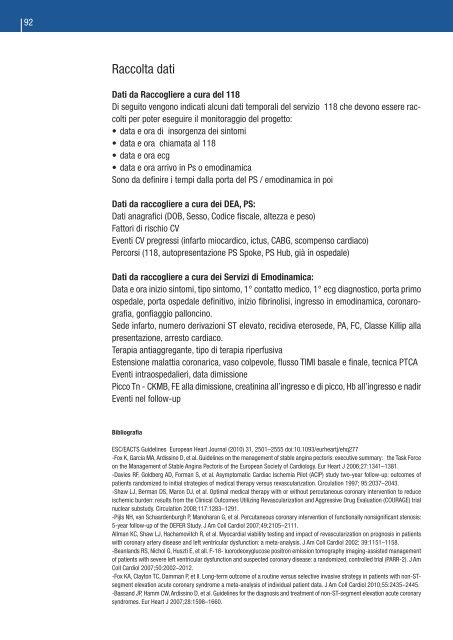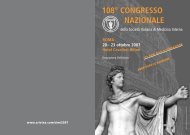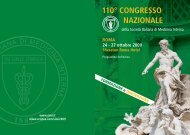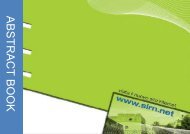HEARTLINE HSM Genoa Cardiology Meeting - Aristea
HEARTLINE HSM Genoa Cardiology Meeting - Aristea
HEARTLINE HSM Genoa Cardiology Meeting - Aristea
You also want an ePaper? Increase the reach of your titles
YUMPU automatically turns print PDFs into web optimized ePapers that Google loves.
92<br />
Raccolta dati<br />
Dati da Raccogliere a cura del 118<br />
Di seguito vengono indicati alcuni dati temporali del servizio 118 che devono essere raccolti<br />
per poter eseguire il monitoraggio del progetto:<br />
• data e ora di insorgenza dei sintomi<br />
• data e ora chiamata al 118<br />
• data e ora ecg<br />
• data e ora arrivo in Ps o emodinamica<br />
Sono da denire i tempi dalla porta del PS / emodinamica in poi<br />
Dati da raccogliere a cura dei DEA, PS:<br />
Dati anagraci (DOB, Sesso, Codice scale, altezza e peso)<br />
Fattori di rischio CV<br />
Eventi CV pregressi (infarto miocardico, ictus, CABG, scompenso cardiaco)<br />
Percorsi (118, autopresentazione PS Spoke, PS Hub, già in ospedale)<br />
Dati da raccogliere a cura dei Servizi di Emodinamica:<br />
Data e ora inizio sintomi, tipo sintomo, 1° contatto medico, 1° ecg diagnostico, porta primo<br />
ospedale, porta ospedale denitivo, inizio brinolisi, ingresso in emodinamica, coronarograa,<br />
gonaggio palloncino.<br />
Sede infarto, numero derivazioni ST elevato, recidiva eterosede, PA, FC, Classe Killip alla<br />
presentazione, arresto cardiaco.<br />
Terapia antiaggregante, tipo di terapia riperfusiva<br />
Estensione malattia coronarica, vaso colpevole, usso TIMI basale e nale, tecnica PTCA<br />
Eventi intraospedalieri, data dimissione<br />
Picco Tn - CKMB, FE alla dimissione, creatinina all’ingresso e di picco, Hb all’ingresso e nadir<br />
Eventi nel follow-up<br />
Bibliograa<br />
ESC/EACTS Guidelines European Heart Journal (2010) 1, 2 01–2 doi:10.109 /eurheartj/ehq277<br />
-Fox K, Garcia MA, Ardissino D, et al. Guidelines on the management of stable angina pectoris: executive summary: the Task Force<br />
on the Management of Stable Angina Pectoris of the European Society of <strong>Cardiology</strong>. Eur Heart J 2006;27:1 1–1 81.<br />
-Davies RF, Goldberg AD, Forman S, et al. Asymptomatic Cardiac Ischemia Pilot (ACIP) study two-year follow-up: outcomes of<br />
patients randomized to initial strategies of medical therapy versus revascularization. Circulation 1997; 9 :20 7–20 .<br />
-Shaw LJ, Berman DS, Maron DJ, et al. Optimal medical therapy with or without percutaneous coronary intervention to reduce<br />
ischemic burden: results from the Clinical Outcomes Utilizing Revascularization and Aggressive Drug Evaluation (COURAGE) trial<br />
nuclear substudy. Circulation 2008;117:128 –1291.<br />
-Pijls NH, van Schaardenburgh P, Manoharan G, et al. Percutaneous coronary intervention of functionally nonsignicant stenosis:<br />
-year follow-up of the DEFER Study. J Am Coll Cardiol 2007; 9:210 –2111.<br />
Allman KC, Shaw LJ, Hachamovitch R, et al. Myocardial viability testing and impact of revascularization on prognosis in patients<br />
with coronary artery disease and left ventricular dysfunction: a meta-analysis. J Am Coll Cardiol 2002; 9:11 1–11 8.<br />
-Beanlands RS, Nichol G, Huszti E, et all. F-18- luorodeoxyglucose positron emission tomography imaging-assisted management<br />
of patients with severe left ventricular dysfunction and suspected coronary disease: a randomized, controlled trial (PARR-2). J Am<br />
Coll Cardiol 2007; 0:2002–2012.<br />
-Fox KA, Clayton TC, Damman P, et ll. Long-term outcome of a routine versus selective invasive strategy in patients with non-STsegment<br />
elevation acute coronary syndrome a meta-analysis of individual patient data. J Am Coll Cardiol 2010; :2 –2 .<br />
-Bassand JP, Hamm CW, Ardissino D, et al. Guidelines for the diagnosis and treatment of non-ST-segment elevation acute coronary<br />
syndromes. Eur Heart J 2007;28:1 98–1660.





